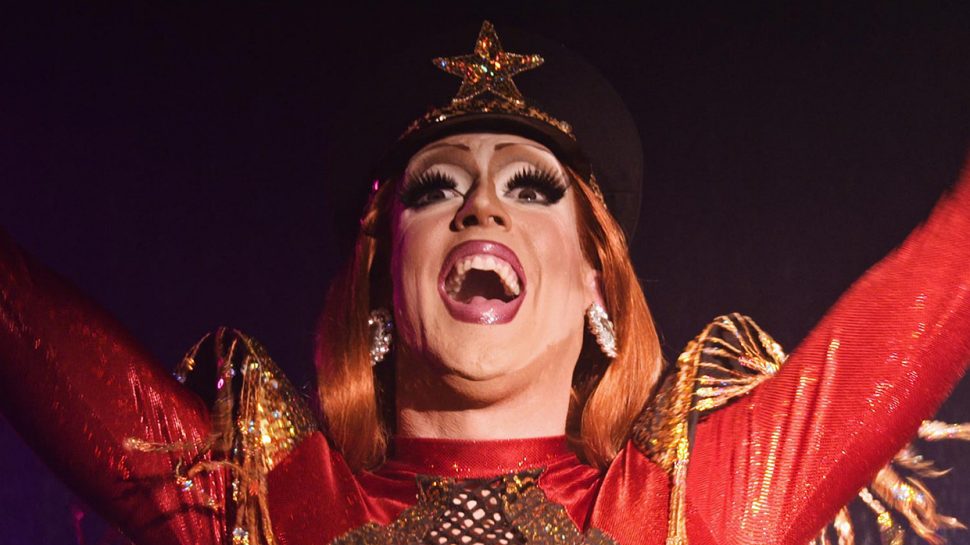Looma Lady Eagles: Kicking goals in the Kimberley
Living in one of the most remote communities in Australia means travelling hours to the nearest store. The Looma Lady Eagles would rather spend that time training so they rely on online shopping and the local post office to get new footy gear.
On the first weekend of September 2017, a group of young Indigenous women clad in team colours of blue and yellow boarded a bus bound for Broome – about 250km from their village in the isolated northwest of Australia. At the end of the three-hour journey, the Looma Lady Eagles would face Cable Beach in the inaugural Women’s West Kimberley Football League (WKFL) Grand Final. They would then go on to make history by winning the premiership.
Candy Skinner, who stepped up as team captain in 2018, smiles as she talks about the victory that took them all by surprise. “We wasn’t expecting to win a premiership in our first year! We was always cheering for the men and celebrating their wins, and now we get to experience the same feeling. It was incredible.”
That premiership win also meant that the Looma women could now pursue the same dream as the community's men – to become national football stars. That dream would have a ripple effect throughout the rest of the community.
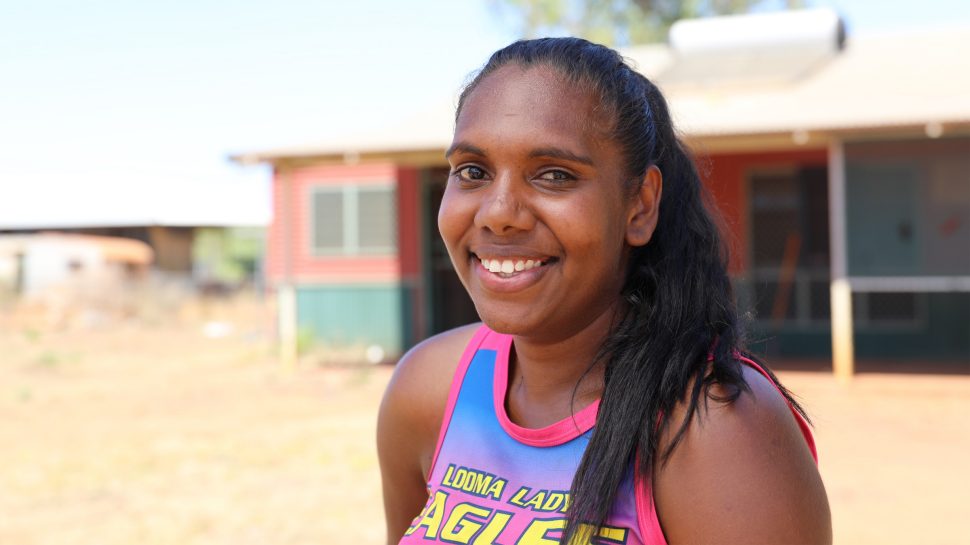
Finding her place on the field
Looma is one of the first officially recognised Aboriginal communities in Western Australia. It’s also one of the most remote in the country. Located about 2,500km northeast from Perth and adjacent to the Fitzroy River, it is home to a population of 500 from different tribes and now to two football clubs. In a region obsessed with AFL, the Looma Lady Eagles club was a long time coming.
Northern Western Australia is dubbed ‘the last frontier of untapped talent’ but while Kimberley men play for state and national teams, it has taken 25 years for the WKFL to bring women from the sidelines onto the field. The recent rise of the AFL Women’s and the establishment of an official women’s league in West Kimberley has opened the door for young women in the bush community to play seriously. Many, like 23-year-old Candy whose childhood was intertwined with the game, have leapt at the opportunity.
“I got introduced to footy through my brothers,” she says. “We used to kick a football in the dust and I would travel with dad to the leagues in Derby. It was so exciting. Dad has a huge impact on why I love this game. As a child, I saw him as my hero, especially when he was out there wearing blue and yellow, and representing our community in a sport he loves. That’s why I play football.”
Candy’s dad, Mark, played footy for 15 years. Today, he’s the coach for the Looma Lady Eagles and Candy wears his number 27. It’s an honour that still overwhelms her.
“It means the world to wear his number and have him pass down his knowledge and love for the game. Being a girl, I never thought I’d have this opportunity because a man passes his number down to his son. It’s unreal, to be honest, and a huge sense of pride.”
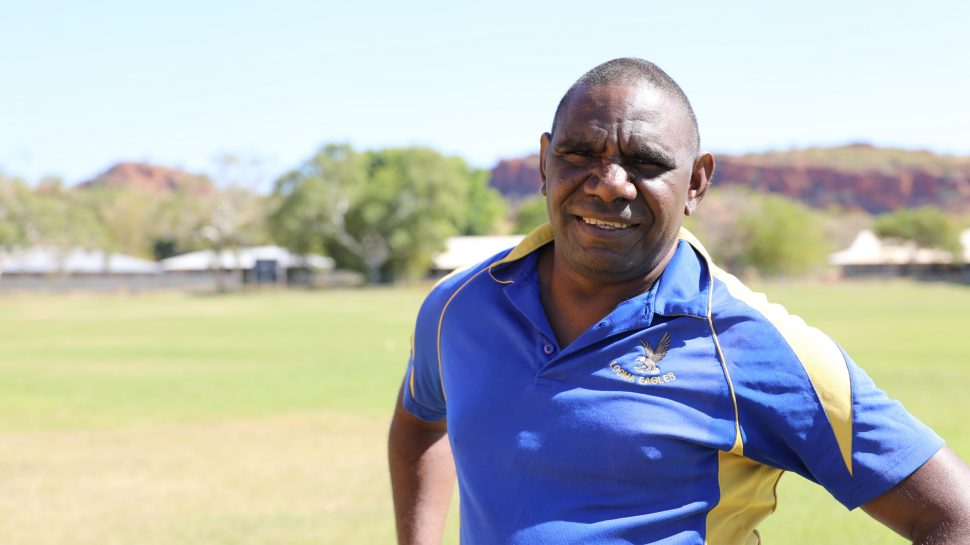
The game changer
The story of the Looma Lady Eagles is one of taking chances. A few months before footy season started, the school’s Physical Education teacher advertised a women’s footy training session.
Many of the women who turned up were single mothers who wanted an activity to keep them busy and improve their fitness. Most of them also assumed the training session was just for one game. It turned out to be for a whole season.
“Then we heard about the Women’s WKFL cup and we thought we’ll join in!” says Candy, who has a young son. “So we asked who would be interested in playing. We had a fair number of names so we was like, okay this is gonna work!”
It was only when the group assembled at the school oval for their first training session that Candy realised that their ambition greatly outweighed their ability. Not everyone had played football beyond their childhood; some hadn’t even held a football before. They would have to start from ground zero.
“We started off learning to properly hold and kick the football and try out what we’d seen the boys do,” Candy says. “We had little confidence back then.” It was clear to the onlookers that the women’s club needed serious help and one of them knew just where to find it.
The next time Mark Skinner turned up at the oval to watch the men’s team train, his cousin was waiting for him. Would he coach the women’s team for just one day? It was a question that would be a game changer in more ways than one. The request surprised him but he readily agreed. Then he found out what he had signed up for.
“I went to their second training session and was like, oh my goodness where do I start?” he laughs. “I had to teach them how to stretch, how to kick, how to handball and how to really understand the game.” By the time the day’s training wrapped up, he knew he would be coaching them for more than “just one day.”
Victory was sweet at the WKFL just a few months later but Mark’s real win had nothing to do with the score. “To me, it wasn't about winning or losing at the end of the day. It was about bringing all those girls together as a family.”
Candy shares that vision. To her, the prospect of being a role model for the younger girls is just as thrilling as playing a national sport that once belonged solely to men. She has also observed how the simple act of working together for a shared goal has changed the relationship dynamics among the girls.
“Footy has brought us together as friends,” Candy says. “Most of the girls grew up in different family groups; some didn’t like each other and some were very shy. We used to walk past each other in the town without interacting. Now that barrier is broken. We go out on the field as sisters and we have each other’s backs. It’s good.”
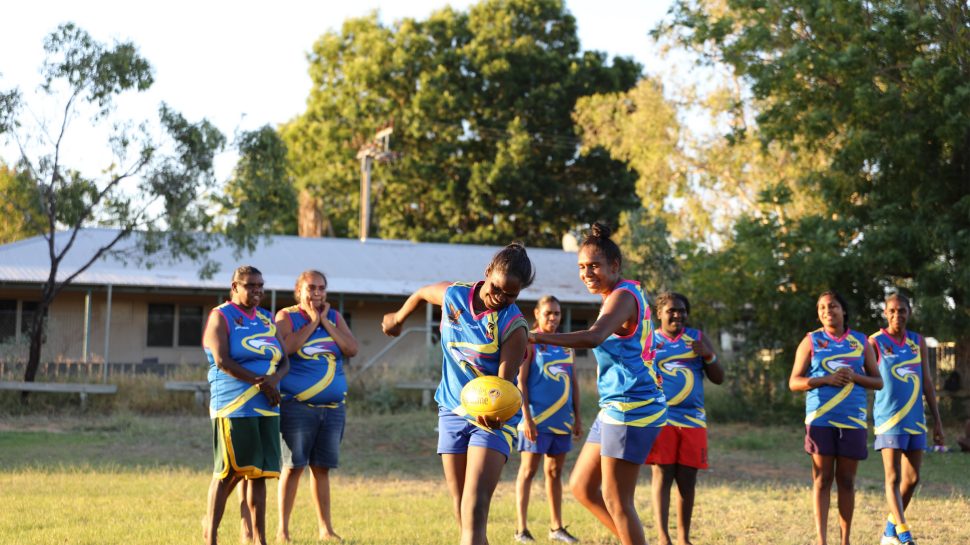
Staying equipped through online shopping
Much has transpired for the Looma Lady Eagles since that day of glory in Broome. For starters, each player now has a proper footy kit comprising long socks, boots, mouth guards, a guernsey, shorts, sports bras, training shirts and an official club shirt designed by one of their own.
Keeping their kits well-stocked means one of two things – travelling three hours to the nearest town or shopping online. For Candy, who’s notorious for losing things on a regular basis, the choice is obvious.
“Online shopping is a huge help when you live in a remote community with one general store. Some of the girls don’t like having the same boots as everyone else so they buy different ones online. Australia Post sends our parcels to Derby and then a bus delivers them to our local post office every Tuesday and Thursday.”
Shopping online may be the preferred choice in Looma but it demands patience and perseverance. The internet signal is patchy in the Kimberley and a single page can often take five minutes to fully load. Yet Candy insists it’s worth the wait.
“Getting parcels is like opening presents on Christmas Day! I open mine right away, partly because everyone wants to know what I’ve bought and partly because I need to test them out. I buy a new pair of socks and tights every week so I can have different ones for each training session and game day. I’m terrible! And I’ve had to buy three pairs of boots this season too because my dog gets to them.”
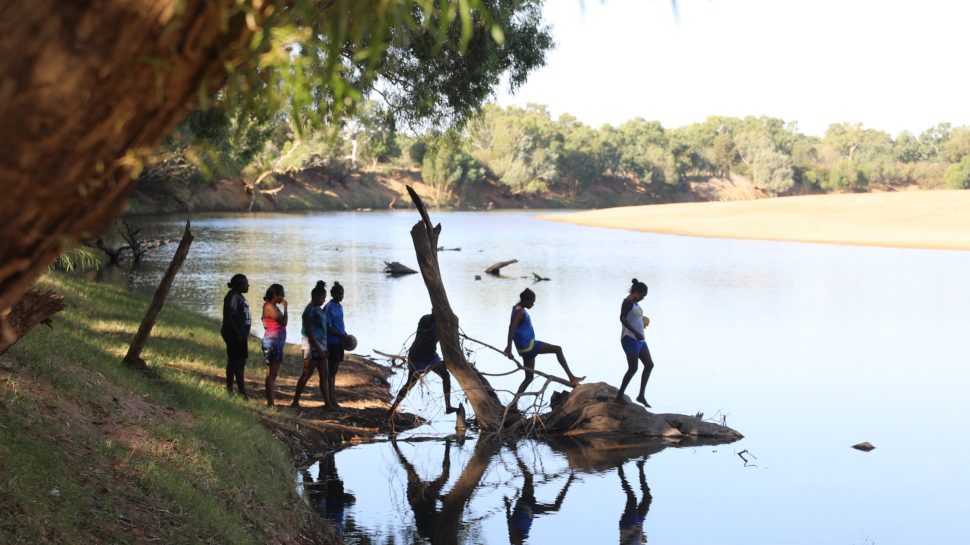
The healing power of a team
The Looma Lady Eagles are now local celebrities and according to Mark, being the talk of the town has brought the community closer. It’s also giving younger girls a pathway to a different life.
The extreme isolation of the Kimberley has seen many small communities there battle issues with alcohol, drugs and violence. The region has one of the lowest life expectancy rates and the highest suicide rates (PDF 582kB) in Australia.
Being a dry community that revolves heavily around sports has helped Looma tackle many of these social issues. The women’s football club is also helping drive that change through what Candy calls “a healing power.”
“There’s a kind of magic in a team,” she muses. “I’ve seen many girls battle their individual struggles and to get things off their mind, they put all their energy onto the footy field. The younger ones, when they’re dealing with suicide and other tough feelings, they’ll come talk to us. It’s about letting them know “we see you, we’ll support you and we’re here for you.” That is so important because we know we can make a difference in their lives.”
As a former player, Mark has experienced firsthand how footy bridged tribal differences to build a solid bond within the team. As a coach, he’s had the rare opportunity to do the same for his young charges.
“I’m glad there’s women’s footy in the Kimberley because it gives the young girls something to look forward to every week. And we’re keeping an eye on them as well. I have rules in my team – if you drink or take drugs, you don’t play. It’s as simple as that. It’s giving them a good start on life now so when they leave the club, they stay on that path.”
In the past year, Candy has watched teenage girls on the team grow as both players and individuals. One of them now plays for the Swan Districts Football Team in Perth in a move that has sparked in the others a new sense of hope and purpose. Looking back, she marvels at how none of them expected their lives to take such a turn when they gathered at the oval that day.
“I thought we would just have fun, interact with each other and then go back to our separate lives. But it’s totally different now and it has changed the community too. Girls are going back to high school, they’re coming out of their shell and they want to get involved in fundraising and the club. These girls are amazing and I’m so proud of what we’ve achieved together.”
Home isn't your only delivery address
With over 4,000 alternative addresses to have your parcel sent to, you can choose a location that’s most convenient to you. Choose a free 24/7 Parcel Locker, a Post Office or your PO Box.


